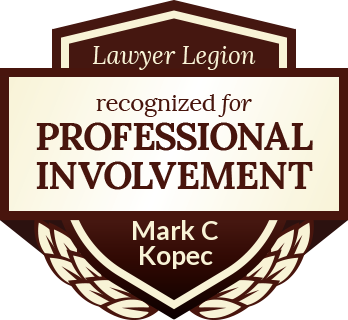Mark Kopec Now
Special Needs Trust
Securing the Future: Structured Settlements and Special Needs Trusts for Malpractice Awards
A large medical malpractice, birth injury or catastrophic injury award presents a crucial, time-sensitive planning challenge. How to provide for the lifelong needs of a disabled individual without stripping them of the essential government benefits they rely upon. The gold standard solution involves a dual strategy. Specifically, the Structured Settlement for income stability and the Special Needs Trust (SNT) for asset protection.
The Kopec Law Firm provides this article to detail the legal framework for establishing and administering a court-ordered SNT. It also discusses the critical role of the Trustee, and the strict rules governing distributions that the Trustee must follow to secure the beneficiary’s future.
I. The Dual Mechanism of Protection
For a malpractice award, the settlement funds must be managed through two interlocking mechanisms to maximize security and also preserve public benefits.
A. The Settlement Payout: Structured Settlement Annuity
Rather than receiving a single lump sum, a portion of the settlement purchases a Structured Settlement Annuity.
- Guaranteed Income: The annuity guarantees a stream of periodic payments—often for the beneficiary’s lifetime—funded by the defendant’s insurer and typically issued by a highly-rated life insurance company. This reliable stream prevents the premature depletion of funds.
- Tax Exemption: Crucially, the payments received are generally exempt from federal and state income taxes under Internal Revenue Service Section 104(a), as they result from a physical injury claim.
B. The Protective Container: Special Needs Trust (SNT)
The payments from the Structured Settlement, along with any immediate cash portion of the award, are not paid to the individual or their Guardian. They immediately go into a court-approved Special Needs Trust (SNT), also known as a Supplemental Needs Trust.
- Benefit Preservation: The core legal purpose of the SNT is to hold the settlement assets without having them count as an available resource. This is essential because eligibility for means-tested public benefits, such as Supplemental Security Income (SSI) and Medicaid (Medical Assistance), often requires the individual to have less than $2,000 in countable assets. The SNT ensures the settlement funds do not cross this threshold.
- The Trustee: The court appoints a Trustee—a fiduciary—who has the sole and absolute legal authority to manage the SNT assets and also control distributions.

II. Distinctions in Special Needs Trusts: The Payback Rule
Because a malpractice settlement is legally defined as money recovered by and for the injured person, it is considered their “own money.” This mandates the use of a specific trust type, governed by strict federal law (42 U.S.C. § 1396p(d)(4)).
The Required Trust: First-Party SNT
| Trust Type | Funding Source | Key Requirement for Settlements | Medicaid “Payback” Provision |
|---|---|---|---|
| First-Party SNT | The beneficiary’s own funds (settlement, inheritance, savings). | Must be established and funded while the beneficiary is under age 65. | MANDATORY: Upon the beneficiary’s death, any remaining funds must first be used to reimburse the state for the total cost of Medicaid benefits paid on their behalf throughout their lifetime. |
| Third-Party SNT | Funds from someone other than the beneficiary (e.g., parents, grandparents). | Cannot be used for settlement funds. | NONE: Remaining funds pass to designated heirs, avoiding state reimbursement. |
Sub-Types for Settlements in Maryland
Settlement funds must go into a court-approved First-Party SNT, which can take one of two forms:
- Stand-Alone SNT (d)(4)(A) Trust: A unique, private trust document drafted specifically for the beneficiary. It is established by the court order and managed by an appointed private Trustee (individual or professional).
- Pooled SNT (d)(4)(C) Trust: The funds deposit into a sub-account within a Master Trust run by a non-profit organization (such as a state disability trust). This is often an attractive option for smaller settlements or for families seeking lower administrative costs and guaranteed professional management, but it remains subject to the same mandatory Medicaid payback provision.
III. The Fiduciary Role: Duties of the Special Needs Trust Trustee
The SNT Trustee is a sophisticated fiduciary who must navigate complex financial and regulatory duties simultaneously. Their performance directly ties to the beneficiary’s continued access to critical public benefits.
A. Core Fiduciary Duties
- Protect Public Benefits: The paramount duty is to ensure every action, especially distributions, complies with SSI and Medicaid rules. Any misstep can result in the loss of critical health coverage or income.
- Prudent Investment: Under the Prudent Investor Rule, the Trustee must invest the trust assets wisely. This involves balancing risk and growth. Balance ensures the funds are available to supplement the beneficiary’s needs over their lifetime, potentially decades into the future.
- Asset Segregation and Accounting: The Trustee must maintain strict segregation between trust funds, their own personal funds, and the beneficiary’s personal funds. They are responsible for obtaining an Employer Identification Number (EIN) for the trust and filing annual Federal and State fiduciary income tax returns (Form 1041).
B. Specific SNT Compliance Duties
- The Sole Benefit Rule: Trustees must make all trust distributions for the “sole benefit” of the disabled individual. This prohibits using SNT funds for anything that primarily benefits a third party, such as paying for another family member’s vacation or covering the living expenses of the Trustee.
- Reporting to the Court: Since the SNT is typically under a guardianship, the Trustee (who may also be the Guardian of the Property) must provide regular, detailed financial accountings of the trust’s activity to the court that maintains oversight.
IV. The Supplementation Principle: Rules for Distributions
The rules for spending are non-negotiable and follow the principle of supplementation, not replacement. The Trustee must pay for goods and services that enhance the ward’s quality of life but are not covered by their benefits, while strictly avoiding payments that the Social Security Administration (SSA) would deem “countable income.”
🛑 Distributions That Trustees Must Avoid (Prohibited)
Trustees must prevent two primary types of expenditures to safeguard eligibility:
| Violation | Description | Impact on SSI/Medicaid | Trustee Action |
|---|---|---|---|
| Direct Cash Payments | Giving the beneficiary cash, bank transfers, or cash-equivalent gift cards. | Counts as unearned income and reduces the SSI benefit dollar-for-dollar in the month received. If the amount is too high, SSI (and resulting Medicaid) is eliminated. | NEVER provide cash directly to the beneficiary. |
| Shelter and Food (ISM) | Paying for basic shelter costs (rent, mortgage, property taxes, utilities) or basic groceries/food. | Counts as In-Kind Support and Maintenance (ISM), resulting in a mandatory reduction of the SSI check by up to one-third of the Federal Benefit Rate (FBR). | AVOID paying for basic shelter/utility costs unless a one-third reduction is a calculated, acceptable trade-off for ensuring housing stability. |
✅ Permissible and Recommended Distributions
To maintain eligibility, the Trustee must pay vendors directly for services and items that truly supplement the beneficiary’s needs.
| Category | Examples of Allowable Expenses (Paid Directly to Vendor) |
|---|---|
| Health & Wellness | Elective medical, dental, and vision care; deductibles/co-pays; specialized therapeutic services (e.g., therapeutic massage, experimental treatments). |
| Quality of Life | Travel and vacations (including expenses for a necessary companion); computers, software, and gaming systems; cell phone and internet services; specialized recreational equipment. |
| Home & Living | Purchase of a primary residence (titled in the SNT’s name, which is an exempt asset); furniture, non-exempt appliances, home security systems, and cleaning services. |
| Transportation | Purchase and maintenance of an accessible vehicle (titled in the trust’s name), insurance, gas, repairs, and ride-share services. |
The Golden Rule: The Trustee must act as a bill-pay service, making all payments directly to the vendor or service provider, never to the beneficiary.
V. Judicial and Administrative Oversight
The court plays a critical role in the settlement and ongoing management of the funds.
- The Initial Court Order: The judge issues an order approving the settlement and disbursement plan, which then legally establishes the SNT. This order ensures the trust document complies with all federal and state requirements, especially the mandatory Medicaid payback provision.
- Restricted Accounts: Any lump sum portion of the settlement may be in a restricted bank account prior to SNT funding. The bank cannot allow any withdrawal from this account unless the Guardian presents a specific court order approving the payment, providing an additional layer of protection against misuse.
- Annual Accounting: The Guardian of the Property must file the Annual Fiduciary’s Account (Form CC-GN-012) with the court. If the Guardian also serves as the Trustee, the court will require detailed accountings of the SNT’s income, investments, and distributions. This ensures the guardian is managing the funds prudently and in compliance with the trust’s terms and federal law.
By adhering to these complex rules for establishing the correct trust, appointing a competent fiduciary, and strictly enforcing the vendor-pay rule, professionals can ensure a medical malpractice settlement provides genuine, long-term financial security for the disabled client.
For a Blog post on the sale of a structured settlement, see Access v. Linton.
If you have any concerns or questions about medical malpractice, then visit the Kopec Law Firm free consultation page or video. Then contact us at 800-604-0704 to speak directly with Attorney Mark Kopec. He is a top-rated Baltimore medical malpractice lawyer. The Kopec Law Firm is in Baltimore and pursues cases throughout Maryland and Washington, D.C.





